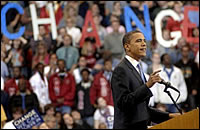Obama Victory: Africa Celebrates

 |
| Can Obama make us believe in change by actually effecting change? |
Putting aside the euphoria and hype and negative or positive comment from Obama’s detractors and admirers, the realities indicate that whoever enters the White House as President in January 2009, will be saddled with a failing economy, lowered credibility and resentment of a neo-imperialist US, two unending and unsuccessful wars and rising economic and political challenges to American hegemony.
To the majority of the people of the world, who distrust the United States as a warmongering global gendarme, obsessed with an ill-advised and highly suspect ‘war on terror,’ [which can be interpreted as a strategy to keep the ‘restless natives’ in their place,] Barack Obama's charisma and enlightened rhetoric could steer the planet away from the gathering storm. For there is a storm gathering, thick with black clouds of uncertainty and insecurity. The world faces erratic climate change, economic meltdown, rising food and fuel prices, failing crops and religious fundamentalism, both Christian and Moslem among others.
In times like these, men yearn for prophets, messiahs or soothsayers to hold their hands. Barack Obama, like a serendipitous heroic archetype appears on the scene, a man for the times, charismatic, modern, media-savvy, embodying and seeking to reconcile two opposed communities–for despite its protestations about democracy, the US is still a society divided by race [a mere forty three years ago African-Americans lived under a peculiarly American system of apartheid called ‘Jim Crow’]. Hillary Clinton, faced with dwindling chances of getting the nomination invoked the spectre of race, claiming that the white working class was behind her. Some of her supporters in Pennsylvania, West Virginia and Kentucky have expressed open hostility to Obama’s candidature, even baying for his assassination. Obama’s volunteers were often threatened throughout the campaign and subjected to racial insults although this was not widely reported in the mainstream press.
Even Condoleezza Rice, so long the good soldier in Bush’s administration finally found her racial voice and declaimed on March 27, 2008 that America still has trouble dealing with race and that "Black Americans were a founding population," she said. "Africans and Europeans came here and founded this country together - Europeans by choice and Africans in chains. That's not a very pretty reality of our founding." Rice added that “… birth defect makes it hard for us to confront it, hard for us to talk about it, and hard for us to realize that it has continuing relevance for who we are today.”
This, coming from the nation’s chief diplomat, speaks volumes. Can Barack Obama change this narrative and inspire Americans to confront their intractable racial demons? What could his presidency mean to Africa and the world? Would he be allowed to fulfill his vision?
Seven years after the attack on the World Trade Centre, America has turned into a paranoid nation, seeing and seeking enemies everywhere, suspicious of its own shadows, finding ‘Muslim extremists’ and ‘jihadist plots’ beneath every bed, torturing and presiding over the most infamous gulag [Guantanamo] of our times. America has alienated friends and allies.Will Obama take America in a different direction?
The President of the United States does not govern in a vacuum and already pressure from different sections is being exerted on Obama. Clinton supporters want the Vice-Presidency as if it is her entitlement, hinting that her 18 million white constituency is a bargaining chip.
In his speech before the American Israel Public Affairs Committee on June 4, 2008, Obama pledged undying American support for Israel, insisting that Jerusalem must remain undivided and the capital of the Jewish state, [a position which dismayed the Palestinians] and even issued nuanced threats against Iran. Obama has qualified his promise to talk to America’s enemies by instituting the word ‘conditional', which suggests that he is being forced to renege on his promises of ‘change.’ His threat to do ‘anything’ to prevent Iran from getting a nuclear weapon disturbed many in the Middle East who see this as one more American President-to-be kissing the feet of the Jewish lobby to benefit from their powerful influence.
If Obama has already been locked into the Israel-good, Arab-bad paradigm, what would this bode for Africa? Should Barack Obama become the next President of the United States, there will be an initial psychological lift for Africans the world over, but on a more realistic level, Africa’s economic, social and political problems will not be solved by Obama. He, as head of the administration might be willing to encourage less unfavourable policies towards Africa, but there is an infrastructure surrounding the US Presidency which will work to constrict him.
His Kenyan roots notwithstanding, Obama, unless he is willing to risk being a one-term President, and possibly his life for the sake of ‘change we can believe in,’ will not be in any position to do much for Africa beyond more of the soaring rhetoric which has propelled him to the Presidential nomination of the Democratic Party. He has to appease the pro-Israel lobby, Congress, the military, and Senator Clinton’s large constituency.
Will he take the gamble to bring a new face, literally and figuratively to America or will he be an American President who promised much, but was not permitted to deliver ? Can Obama make us believe in change by actually effecting change? We must not discount the towering historical achievement of his nomination and possible Presidency, but we must also be skeptical. Only time will tell. We must be on guard against the real possibility that entrenched Americans interests will not let him.
The coming contest and its aftermath will prove whether America has finally matured as a nation. But one must temper expectations with skepticism and keen observation. American racism is still potent and the world’s hopes could yet vanish in smoke and mirrors.
